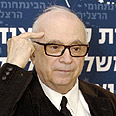
Winograd Commission member slammed for political comments
Prof. Yehezkel Dror says in interview to Maariv, 'What would you prefer? A government under Olmert and Barak, or new elections that would see Bibi rise to power?' Dror claims he was misquoted; summoned by State Control Committee for hearing. Commission members: We stand behind war report
The State Control Committee summoned Prof. Yehezkel Dror, a member of the Winograd Commission, for an urgent hearing following controversial statements he made regarding the Israeli political arena.
The committee's chairman, MK Zevulun Orlev is also expected to decide whether to summon the head of the Winograd Commission, retired justice Eliyahu Winograd, to the hearing as well.
In an interview to Israeli daily Maariv published Wednesday, Dror said, "If we believe that the prime minister could promote the peace process, this is quite a lofty consideration. If the peace process succeeds, this could save so many lives, and therefore this is a substantial consideration."
In the interview, Dror was also asked whether Prime Minister Ehud Olmert should continue to serve as prime minister, and replied: "We need to think of the consequences. What would you prefer? A government under Olmert and (Defense Minister Ehud) Barak, or new elections that would see Bibi (Likud Chairman Benjamin Netanyahu) rise to power?"
MK Orlev (NRP), said that Dror's words raised heavy suspicions of corruption.
Dror told Ynet Wednesday that his words have been taken out of context. "I spoke as a private individual and a professor for political science," he stressed.
"I presented a professional stance as a political science professor, without expressing my political views… this has nothing to do with the Winograd Commission."
In an official statement released Wednesday, Dror further said: "The statements were made in a conversation with the reporter during which we discussed the ways in which the public should address issues of public ethics. The statements did not contain any expression of preference regarding government members; they did not express my personal stance and certainly never came up during Winograd Commission sessions."
Winograd Commission: We stand behind report
The Winograd Commission published an official response to the interview, saying: "Following the publication of partial statements attributed to Prof. Yehezkel Dror, we wish to stress that the commission has completed its role by issuing its report to the government. The commission has had its final say, as expressed in both the partial and final report and there alone. Any interpretations of the report, even when made by the commission's members, are the sole responsibility of those who deliver them.
"We believe that those who served on the commission have no advantage over any other reader or interpreter in interpreting the report, its conclusions or recommendations. We are disputed over the issue of how the commission member should conduct themselves after the publication of such a report. We could not have prevented those of us who wished to express themselves on the subject from doing so after the report was released. This disagreement in no way undermines our joint belief that the commission itself stands behind the report and everything that it contains."
"In the process of the commission's work… we made sure to maintain a perception of duty that refrained from addressing controversial political issues. Considerations regarding questions such as who should lead Israel have never been raised during the commission's work and discussions. We do not even know where the commission members stand on these issues."
'Commission lost its legitimacy'
MKs from across the political spectrum slammed Dror's statements, claiming they worked to invalidate the conclusions of the Winograd Commission.
Likud MK Silvan Shalom claimed that if Dror indeed made the statements attributed to him, a new state commission should be set up. "If a member on the commission claims that the considerations that guided him pertained to who could bring peace and who would be prime minister, this calls for a state commission of inquiry."
Another Likud MK, Gilad Erdan, added: "This exposes the lie behind the Winograd Commission and proves that it is corrupt and tainted by political considerations. It now becomes clear why the commission decided not to issue personal conclusions… the report should be tossed in the garbage."
Labor MK Shelly Yacimovich also stated that a new commission of inquiry would be formed instead of the Winograd Commission. "It turns out that at least one of the members of the commission acted out of political motives… while the public naively believed that the commission was unbiased."
Meretz Chairman MK Yossi Beilin said that "the question regarding the prime minister's ability to promote peace should not have been considered by the members of a public commission of inquiry appointed to investigate the war's failings. This is an issue that the political parties and the public should decide on… if this was indeed taken into consideration by the commission, that it has lost its legitimacy."
Attila Somfalvi and Amnon Meranda contributed to the report










